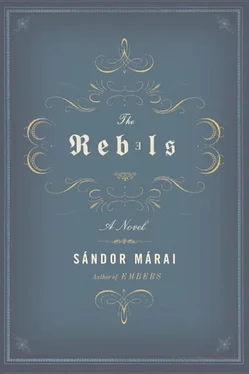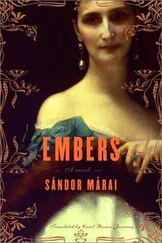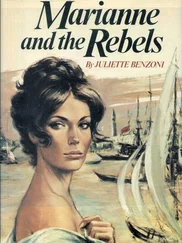Now Tibor moved, pushed the book under the desk, and looked around inquiringly, returning to the world. For a moment Ábel could see those fleshy, sulky lips head-on. They indicated a state of bored annoyance. He felt shaken for a second. Out of the blue, without even thinking about it, the words How beautiful he is! came to him. These four words decided the matter. Then Tibor bent down again and Ábel could only see the crown of his head, the boy between them hiding him from view. This caused him such pain it was as if someone had forcefully robbed him of a unique, once-in-a-lifetime experience. It was a bodily pain occasioning a terrible sense of loss, the kind a dog feels when you snatch his half-eaten dish from him, or what anyone might feel when a breathtaking landscape is suddenly obscured by a tunnel. He felt such pain and fury it made him want to groan out loud. There were practically tears in his eyes as he shifted slightly to one side and rose a little from his seat in order to see Tibor, now, immediately, now while the beauty lasted, for one second too late and it would be gone. And it was true: for when they met at break and he could look calmly, with even a certain curiosity, into Tibor’s eyes, he was disappointed to discover that he felt nothing at all.
But when he was alone in his room that afternoon, while he was drawing something, just as he had pushed away the drawing board and was starting to fiddle with the brush, somewhere between the two movements the feeling returned, much more powerful now than it had been in the morning. It was so strong that his whole body ached as he shifted: it reared up at him as he bent over the desk. He is beautiful, he cried out, half audibly. It was a wholly intangible feeling. It was a kind of happiness he had never even dreamt of. There was a sweetness to it, a taste that brought tears to his eyes. It made him shake. He is beautiful: Tibor is beautiful, he repeated with bloodless lips, feeling a touch chilly. His hand was cold too, bloodless and trembling. He stood up and ran about the room a little, avoiding the furniture. There were tears in his eyes: he felt dizzy and would have liked to hold on to something. A desire for oblivion flooded through him. This was the ultimate thing, this beauty. There was nothing else. The world could offer no more. The tame world he had so far inhabited was split wide open, its contents ran out: he stood naked and shivering.
A week later the gang was formed. It takes hardly a moment to form a crystal from the appropriate miscellaneous elements: you cannot know what process preceded the formation, just as we cannot know what drives certain people together, people who hitherto knew nothing of each other, but who immediately form a solid body under conditions that create more anxiety than guilt ever does: so it is with parents and children, so with lovers, and so with murderers. They launched forth from the four corners of that room, each greedy for the others, as if they had been waiting years for precisely this, as if they had a thousand things to communicate and share. Within a week the four of them were as one though they had hardly said a word to each other before. Béla, on whom they had slightly looked down, was practically breathless in the effort to join them before it was too late. Once all four were together in a nook of the corridor they looked into each other’s eyes and started to speak. Ernõ took off his pince-nez and they suddenly fell silent. Tibor stood in the center. He started to say something but the words stuck in his mouth. The other three were looking at him. They waited, silent a while, then all four slowly shuffled back to their places.
THEY WERE STANDING BY THE REVOLVING DOORSof the café. The actor took his hand for a second. The Roman emperors had been absolute rulers. There was something of Nero in Amadé. Nero himself had been an actor. Fine. In any case you are the first adult whom I can address familiarly as tu, with whom I am on tutoyer terms, as an adult with adults. He says he has visited Barcelona. He might be lying. One should check up and make sure. Father is sitting down to supper. He might have amputated four legs by now, legs as substantial as this actor’s. Here’s Lajos. He has half an arm missing. Amadé is wearing a pale brown necktie today: this is the fourth necktie he has been seen wearing. Here comes Mr. Kikinday whom someone seems to have sentenced to death. His necktie is dark blue with white spots. Yellow silk with green stripes. White silk with big blue spots. Etelka has a blouse that is white silk with big blue spots. She no longer wears it: it is a year since she last had it on. Amadé always has that cinnamon smell. We were playing in the garden with the janitor’s daughter, then we went to the shed and played a game in which I punished her so she had to lie down and I pulled up her skirt and beat her bare bottom till it was red. Then Etelka turned up, saw us, and gave us a beating. I was four. The girl three. Etelka was forty. Once she left the door open to the cupboard full of underwear and I pulled out a shred of cloth and played with it, tying it round my head the way the maid does her headscarf. Etelka grew quite red when she saw me, snatched the cloth from me, and smacked my hand. Today I know the thing I was playing with was her brassiere, that the piece of cloth she dashed off with was a brassiere fresh from the laundry. I was four. How do I know now that the shred of cloth was my aunt’s brassiere? No one told me. And what was there so outrageous about the fact that my aunt had breasts that required support? How warm that hand is. His hand is so soft that my index finger sinks into the pad of flesh in his palm. Amadé’s wig is nicely fixed. When I found my aunt’s hair in the cupboard behind the books I thought I had finally unmasked her. My aunt had no wig but she did wear hairpieces. I discovered two fat shiny pigtails. I might tell Tibor that later in the evening. Or perhaps Amadé. Maybe neither, but just Ernõ. If I told Amadé he would answer with some nonsense rhyme like “Round pig, little pig, open mouth, and jig-jig-jig!” And he’d open his mouth and stick his fleshy tongue out between his thick lips as he always does. He’s laughing now and I can see his gold teeth. The actor released his hand. They went in through the revolving doors.
THE REVOLVING DOORS MOVED ROUND WITHthem and they entered the café. It was the sort of hour at which cafés in provincial towns are empty but for the usual roster of dubious characters. The only signs of life were in the separate card rooms. In one room sat two lawyers, the editor of a local paper, and a very short man with hair carefully parted in the middle, his outfit selected with painstaking refinement. Opposite the door sat Havas. He was holding cards in his hand, his bald head glistening with drops of perspiration. Now and then he dipped his hand into his pocket and wiped his brow with a red handkerchief. The man who used to run the mill, now the owner of the town pawnbroker’s shop, declared, Three-card run, two aces, game, as they passed him. The actor and Ábel stopped to greet them. Havas made as if to rise from his chair but never moved: the vast body remained glued to his seat. He congratulated them. Your friends are already here. He seemed absent-minded, radiant with a kind of happiness that quickly drew him back to his cards. He declared himself in for the next round. The air in the card room was sour, worse than in the main part of the café. This might have been because the card players, having played for several hours, had grown careless of social niceties, or because it was difficult to air those little booths and the players were perspiring rather heavily. They threw their cigar butts on the floor. One or two of them spat on the remains and the dying stubs filled the lower regions of the café with acrid smoke. The gang sat in a little booth as they used to do when the café was still strictly out of bounds to them. The actor immediately sat himself at the head of the table. Ábel took his place by Ernõ.
Читать дальше












